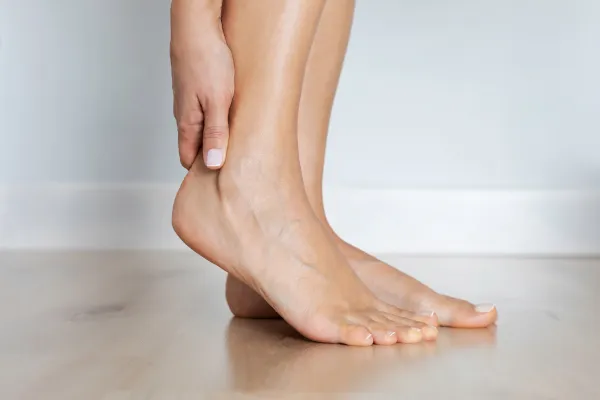Tips & Advice From Foot & Ankle Associates of Southern NH

Managing Ankle Pain During Pregnancy: Common Causes and Relief Strategies
Pregnancy is an exciting time, but it can also bring about various physical changes that lead to discomfort and pain. One of the most common complaints among pregnant women is ankle pain. The added weight, changes in posture, and hormonal shifts can put stress on the feet and ankles, making it harder to move around and complete daily tasks. At Foot and Ankle Associates of Southern NH, we’re here to help you understand the causes of ankle pain during pregnancy and provide practical solutions for relief.
Common Causes of Ankle Pain During Pregnancy
Increased Weight Gain
As your baby grows, so does the weight you carry. The extra weight puts additional pressure on your feet and ankles, which can lead to discomfort and pain. This added strain may exacerbate existing conditions like flat feet or lead to new issues, such as heel pain or Achilles tendonitis.Swelling (Edema)
Swelling, or edema, is common during pregnancy, particularly in the third trimester. The body retains more fluid, which can accumulate in the feet and ankles, causing them to feel tight, sore, and swollen. This is often more noticeable in the evenings or after standing for long periods.Hormonal Changes
Pregnancy causes hormonal changes that prepare the body for childbirth. One of the hormones, relaxin, softens and relaxes the ligaments in your body, especially around the pelvis. While this is essential for labor, it can also affect the stability of the ankles, making them more prone to injury or strain.Postural Changes
As your pregnancy progresses, your body’s center of gravity shifts forward due to the growing belly. This shift often causes you to change your walking patterns and posture, placing additional stress on the ankles, feet, and lower legs. These changes can lead to discomfort and pain.Flat Feet
Due to the extra weight and hormonal changes, pregnant women are more likely to develop flat feet, a condition where the arches of the feet fall. This can cause the ankles to roll inward, putting added strain on the ankles and leading to pain.
Relief Strategies for Ankle Pain During Pregnancy
Managing ankle pain during pregnancy doesn’t require you to suffer in silence. There are several strategies that can help alleviate discomfort and provide much-needed relief.
Elevate Your Feet
Elevating your feet whenever possible can help reduce swelling and relieve pressure on your ankles. Try lying down and propping your feet up on a pillow or using a footrest to keep your legs elevated while sitting.Wear Supportive Shoes
Avoid wearing high heels or shoes that don’t provide adequate support. Instead, opt for shoes with good arch support, cushioning, and a low heel. Orthotic insoles can also provide additional support and relieve pressure on your feet and ankles.Stay Active, But Avoid Overexertion
Regular physical activity can help improve circulation and reduce swelling. Low-impact exercises such as walking, swimming, and prenatal yoga are great options. However, be mindful not to overexert yourself, and always listen to your body.Apply Cold Compresses
If your ankles are swollen, applying a cold compress or ice pack can help reduce swelling and numb the pain. Just be sure to wrap the ice in a towel to protect your skin from direct contact.Massage and Stretching
Gentle massage of the feet and ankles can help improve circulation and ease tension. Light stretches for your calves and ankles can also relieve tightness and reduce discomfort. Consider using essential oils like lavender for added relaxation.Compression Socks
Compression stockings or socks can help reduce swelling by improving circulation. They work by applying gentle pressure to the feet and ankles, which helps prevent fluid from accumulating in the lower extremities.Consult with a Podiatrist
If your ankle pain is persistent or severe, it’s a good idea to consult with a podiatrist. At Foot and Ankle Associates of Southern NH, we specialize in treating pregnancy-related foot and ankle pain. A podiatrist can provide a personalized treatment plan, recommend orthotics, and give you expert advice on managing pain.
When to Seek Medical Attention
While mild swelling and discomfort are common during pregnancy, certain symptoms should not be ignored. Seek medical attention if you experience:
Severe or sudden swelling, especially in one leg
Pain that doesn't improve with rest or becomes more intense
Redness or warmth around the ankle, which could indicate an infection
Difficulty walking or standing due to pain or swelling
These symptoms could be a sign of more serious conditions, such as deep vein thrombosis (DVT) or preeclampsia, and should be addressed promptly.
Conclusion
Ankle pain during pregnancy is common, but it doesn’t have to interfere with your daily life. By incorporating simple strategies like elevating your feet, wearing supportive footwear, staying active, and seeking professional care, you can manage discomfort and continue to enjoy this special time. If you're struggling with ankle pain or swelling, don’t hesitate to contact us at Foot and Ankle Associates of Southern NH. We are here to help you find the best solution for your foot health during pregnancy.
Ask Foot & Ankle Associates of Southern NH And Their Team
Fill in the form to request a call from our team. One of our team members will call you for FREE and answer any questions or concerns you may have about your condition
Where To Find Foot & Ankle Associates of Southern NH

If you have any questions before scheduling an appointment or for general inquiries, please use the contact us button below. Our team will promptly reach out to assist you.
Opening Hours
Monday: 8:00am – 5:00pm
Tuesday: 8:00am – 5:00pm
Wednesday: 8:00am – 2:00pm
Thursday: 8:00am – 5:00pm
Friday: 8:00am – 2:00pm
Saturday: Closed
Sunday: Closed

